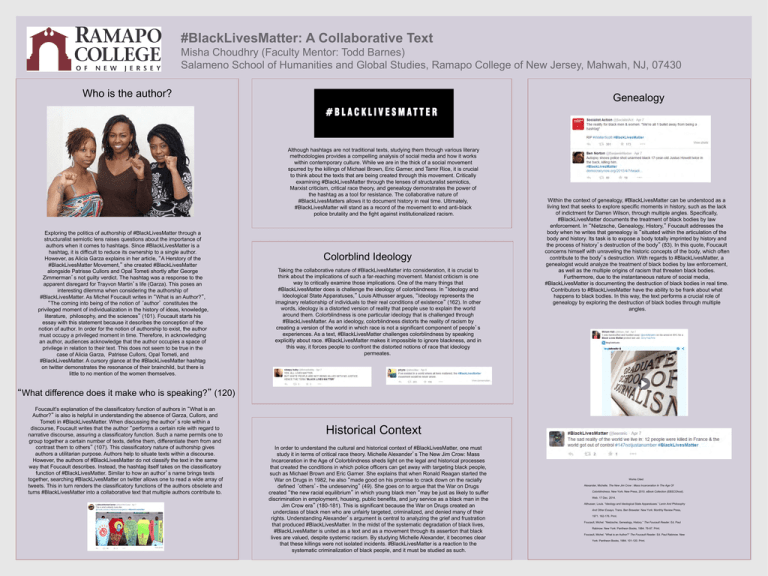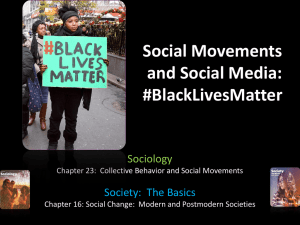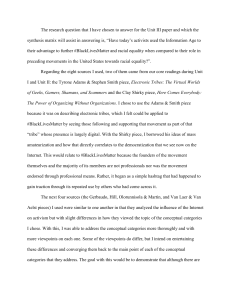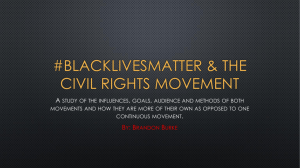#BlackLivesMatter: A Collaborative Text
advertisement

#BlackLivesMatter: A Collaborative Text Misha Choudhry (Faculty Mentor: Todd Barnes) Salameno School of Humanities and Global Studies, Ramapo College of New Jersey, Mahwah, NJ, 07430 Who is the author? Genealogy Although hashtags are not traditional texts, studying them through various literary methodologies provides a compelling analysis of social media and how it works within contemporary culture. While we are in the thick of a social movement spurred by the killings of Michael Brown, Eric Garner, and Tamir Rice, it is crucial to think about the texts that are being created through this movement. Critically examining #BlackLivesMatter through the lenses of structuralist semiotics, Marxist criticism, critical race theory, and genealogy demonstrates the power of the hashtag as a tool for resistance. The collaborative nature of #BlackLivesMatters allows it to document history in real time. Ultimately, #BlackLivesMatter will stand as a record of the movement to end anti-black police brutality and the fight against institutionalized racism. Within the context of genealogy, #BlackLivesMatter can be understood as a living text that seeks to explore specific moments in history, such as the lack of indictment for Darren Wilson, through multiple angles. Specifically, #BlackLivesMatter documents the treatment of black bodies by law enforcement. In “Nietzsche, Genealogy, History,” Foucault addresses the body when he writes that genealogy is “situated within the articulation of the body and history. Its task is to expose a body totally imprinted by history and the process of history’s destruction of the body” (83). In this quote, Foucault concerns himself with unraveling the historic concepts of the body, which often contribute to the body’s destruction. With regards to #BlackLivesMatter, a genealogist would analyze the treatment of black bodies by law enforcement, as well as the multiple origins of racism that threaten black bodies. Furthermore, due to the instantaneous nature of social media, #BlackLivesMatter is documenting the destruction of black bodies in real time. Contributors to #BlackLivesMatter have the ability to be frank about what happens to black bodies. In this way, the text performs a crucial role of genealogy by exploring the destruction of black bodies through multiple angles. Choudhry 1 Exploring the politics of authorship of #BlackLivesMatter through a structuralist semiotic lens raises questions about the importance of authors when it comes to hashtags. Since #BlackLivesMatter is a hashtag, it is difficult to reduce its ownership to a single author. However, as Alicia Garza explains in her article, “A Herstory of the #BlackLivesMatter Movement,” she created #BlackLivesMatter alongside Patrisse Cullors and Opal Tometi shortly after George Zimmerman’s not guilty verdict. The hashtag was a response to the apparent disregard for Trayvon Martin’s life (Garza). This poses an interesting dilemma when considering the authorship of #BlackLivesMatter. As Michel Foucault writes in “What is an Author?”, “The coming into being of the notion of ‘author’ constitutes the privileged moment of individualization in the history of ideas, knowledge, literature, philosophy, and the sciences” (101). Foucault starts his essay with this statement because it describes the conception of the notion of author. In order for the notion of authorship to exist, the author must occupy a privileged moment in time. Therefore, in acknowledging an author, audiences acknowledge that the author occupies a space of privilege in relation to their text. This does not seem to be true in the case of Alicia Garza, Patrisse Cullors, Opal Tometi, and #BlackLivesMatter. A cursory glance at the #BlackLivesMatter hashtag on twitter demonstrates the resonance of their brainchild, but there is little to no mention of the women themselves. Colorblind Ideology Taking the collaborative nature of #BlackLivesMatter into consideration, it is crucial to think about the implications of such a far-reaching movement. Marxist criticism is one way to critically examine those implications. One of the many things that #BlackLivesMatter does is challenge the ideology of colorblindness. In “Ideology and Ideological State Apparatuses,” Louis Althusser argues, “Ideology represents the imaginary relationship of individuals to their real conditions of existence” (162). In other words, ideology is a distorted version of reality that people use to explain the world around them. Colorblindness is one particular ideology that is challenged through #BlackLivesMatter. As an ideology, colorblindness distorts the reality of racism by creating a version of the world in which race is not a significant component of people’s experiences. As a text, #BlackLivesMatter challenges colorblindness by speaking explicitly about race. #BlackLivesMatter makes it impossible to ignore blackness, and in this way, it forces people to confront the distorted notions of race that ideology permeates. Chou “What difference does it make who is speaking?” (120) Foucault's explanation of the classificatory function of authors in “What is an Author?” is also is helpful in understanding the absence of Garza, Cullors, and Tometi in #BlackLivesMatter. When discussing the author’s role within a discourse, Foucault writes that the author “performs a certain role with regard to narrative discourse, assuring a classificatory function. Such a name permits one to group together a certain number of texts, define them, differentiate them from and contrast them to others” (107). This classificatory nature of authorship gives authors a utilitarian purpose. Authors help to situate texts within a discourse. However, the authors of #BlackLivesMatter do not classify the text in the same way that Foucault describes. Instead, the hashtag itself takes on the classificatory function of #BlackLivesMatter. Similar to how an author’s name brings texts together, searching #BlackLivesMatter on twitter allows one to read a wide array of tweets. This in turn renders the classificatory functions of the authors obsolete and turns #BlackLivesMatter into a collaborative text that multiple authors contribute to. Historical Context In order to understand the cultural and historical context of #BlackLivesMatter, one must study it in terms of critical race theory. Michelle Alexander’s The New Jim Crow: Mass Incarceration in the Age of Colorblindness sheds light on the legal and historical processes that created the conditions in which police officers can get away with targeting black people, such as Michael Brown and Eric Garner. She explains that when Ronald Reagan started the War on Drugs in 1982, he also “made good on his promise to crack down on the racially defined ‘others’- the undeserving” (49). She goes on to argue that the War on Drugs created “the new racial equilibrium” in which young black men “may be just as likely to suffer discrimination in employment, housing, public benefits, and jury service as a black man in the Jim Crow era” (180-181). This is significant because the War on Drugs created an underclass of black men who are unfairly targeted, criminalized, and denied many of their rights. Understanding Alexander’s argument is central to analyzing the grief and frustration that produced #BlackLivesMatter. In the midst of the systematic degradation of black lives, #BlackLivesMatter is united as a text and as a movement through its assertion that black lives are valued, despite systemic racism. By studying Michelle Alexander, it becomes clear that these killings were not isolated incidents. #BlackLivesMatter is a reaction to the systematic criminalization of black people, and it must be studied as such. Works Cited Alexander, Michelle. The New Jim Crow : Mass Incarceration In The Age Of Colorblindness. New York: New Press, 2010. eBook Collection (EBSCOhost). Web. 17 Dec. 2014. Althusser, Louis. “Ideology and Ideological State Apparatuses.” Lenin And Philosophy And Other Essays. Trans. Ben Brewster. New York: Monthly Review Press, 1971. 162-176. Print. Foucault, Michel. “Nietzsche, Genealogy, History.” The Foucault Reader. Ed. Paul Rabinow. New York: Pantheon Books, 1984. 76-97. Print. Foucault, Michel. “What is an Author?” The Foucault Reader. Ed. Paul Rabinow. New York: Pantheon Books, 1984. 101-120. Print.



